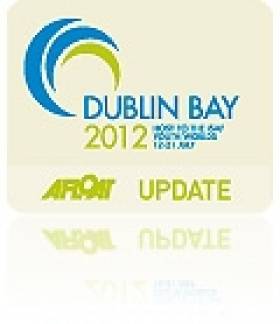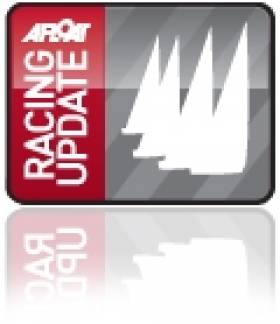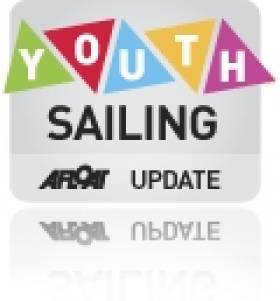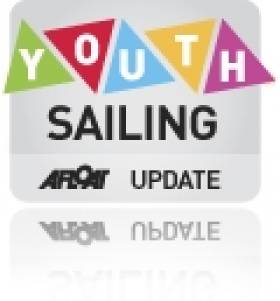Displaying items by tag: SL16
#dublinbay2012 – There will be host nation debuts in both the SL16 catamaran and 29er skiff classes at the 2012 Four Star Pizza ISAF Youth Worlds on Dublin Bay in ten days time.
Sean Donnelly and Tadgh Donnelly compete in the 29er and Alexander Rumball and Rory McStay go in the SL16 but as the championships is also set to welcome back 2011 gold medallists in both the SL16 and 29er the Irish crews have their work cut out.
Martin Lowy and Kim Andrade (BRA) head to Dublin to defend the SL16 title they comprehensively won in Zadar, Croatia last year whilst Spain's Carlos Robles and Florian Trittel (ESP) will be aiming to do the double.
The 15 strong SL16 fleet has the makings of an excellent competition with five of the six medallists at the 2011 ISAF Youth Worlds back again.
Lowy and Andrade blew the competition away in the light winds in Croatia that were prevalent at the start of the competition winning eight races in a row to set them up for the gold medal. When the big conditions came in the Brazilians finished mid-fleet as Danish twin brothers Nicolaj and Daniel Bjornholt Christiansen kicked it up a gear with four top two finishes.
The Danes comeback only proved enough for the silver medal as the Brazilians won by a seemingly comfortable margin of seven points.
The conditions in Ireland may suit the Bjornholt Christiansen's whose size will prove advantageous. Great Britain's Rupert White finished third with Nikola Boniface in 2011, he returns with Tom Britz.
In four years' time the Mixed Multihull will be on show at the Rio 2016 Olympic Sailing Competition following the selection of the Nacra 17. The Open SL16 event at this year's regatta features several mixed crews. Paul Darmanin and Lucy Copeland (AUS) are one of those in Dublin with Rio 2016 on their mind, "The mixed multihull for the Games is on our rader but I just want to focus on the Youth Worlds at the moment," said Darmanin who won SL16 gold in 2010 as crew with Chase Lurati.
"My cousin Jason and sister Lisa are training very hard working towards the 2016 Games so for me to try for the Olympics I would have to battle it out against them.
"Competing at the Olympic Games would be the ultimate dream come true as it is the highest level of sailing around. I love representing Australia so doing it at the Olympics would be fantastic."
New Zealand's Tomer Simhony finished fifth at the 2011 ISAF Youth Worlds in the SL16 with Ellie Copeland and is back again with another female crew, Gemma Jones. And the pair have considered their futures, "I think they [ISAF] made the right choice with the Nacra 17," said Simhony. "Gemma and I have discussed sailing together and will at least try to get a boat in the next two years and start a campaign. We'll see how it goes."
Twenty six teams will compete for 29er gold but the undermining favourites coming into the event are the 2011 Champions Carlos Robles and Florian Trittel (ESP). The Spaniards stormed to gold in Zadar, Croatia with a string of consistent results over 12 races to claim gold by 18 points.
With only Klaus Lange and Mateo Majdalani (ARG) returning from the top ten finishers in 2011, the Spaniards will aim for a second successive gold. Other returnees from 2011 include Paul Kohlhoff and Carolina Werner (GER), Varun Thakkar and Ganapathy Kelapanda (IND), as well as Alex Burger and Alex Lehtinen (RSA).
The fleet features a new wave of young sailors who will be seen beyond 2012 with 43 of the 52 sailors competing in the 26-boat fleet eligible to sail at the 2013 edition in Limassol, Cyprus. Belgium's Emile Van Holsbeke will be the youngest competitor in the 29er fleet at just 14-years-old. He will crew alongside Daan Vandormael.
Racing at the 2012 Four Star Pizza ISAF Youth Sailing World Championship begins on 14 July in Dun, Laoghaire, Ireland running until 20 July.
#RACING ROUND–UP – Ireland's Star pair Peter O'Leary and David Burrows are in the frame at the Star worlds in Hyeres this morning having held the lead after thie first two races, James Espey is Olympic bound in his Laser dinghy following qualification in Germany last night, Alexander Rumball and Rory McStay are joining the Irish ISAF Youth Worlds squad as Ireland's first Catamaran pairing, Offshore J109s continue to dominate on the Irish Sea and ICRA is still seeking support to mount a defence of its 2010 Commodore's Cup victory.
Kinsale's Marcus Hutchinson won the South Coast Squibs, JP McCaldin was on form at the J24 Easterns in Howth, Derek Mitchell was top in Saturday's DBSC Ruffian race, Foynes Yacht Club cruised to Limerick and Andrew Algeo emerged a winner in a class that have changed much more than their racing format.
300 Top Junior Sailors Bound for Dublin Bay
Over 300 sailors will compete in Dublin Bay in seven different classes (Laser Radial, Laser 4.7, 420, Feva, Topper, SL16 and Optimist). For youth sailors, this event is the most important in the annual calendar as it is the decider for the top Irish sailors to compete internationally during 2011 and is the pathway for future Olympic sailors. Podcast with Olympic Team Manager James O'Callaghan here.
The 420 fleet is already in situ as the Leinster Championships were held over Easter and the girls team Emma Geary and Niamh Connolly won the event in style. This team is the only 420 crew to qualify internationally for a place on the Irish team to compete in the ISAF Youth Worlds in Zadar, Croatia and will be looking to win next weekend to secure this honour.
Dublin Bay will host the 2012 ISAF Youth World Championships and this year's ISA Mitsubishi Youth National event is an important test event with representatives from the international sailing authority visiting Dun Laoghaire to view plans and test logistics.
In addition to the 420 fleet the Laser radial fleet will also be competing to qualify to represent Ireland in Croatia. Philip Doran aged 17 from Courtown in Wexford is the current former under 17 World Champion in the Laser Radial fleet although the National title has eluded him so far. In the girls fleet it will be a toss up between Saskia Tidey (RIYC) and Sophie Murphy (Quoile YC) as both already have a national title each under their belts.
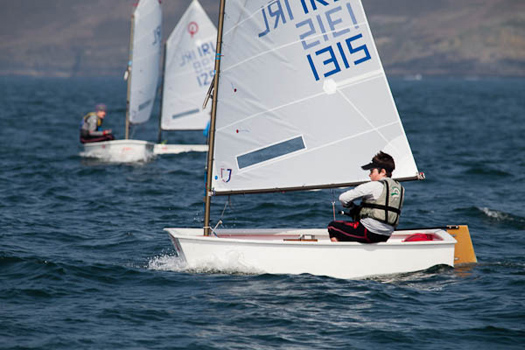
A fleet of top Optimists are expected. Photo: Bob Bateman
The younger Optimist fleet is also celebrating this week after two top 5 positions at the Easter Regatta in Braassemermeer, the Netherlands. In fact an Irish team has competed at this event for 23 years and this is the first time that Ireland has won the country prize. Sean Donnelly from Dun Laoghaire who finished fourth in Braassemermeer is also leading the Optimist fleet in the trials and will be anxious to hold on to first position during the ISA Mitsubishi Youth Nationals.
In other fleets, the laser 4.7 fleet is enjoying record numbers with many ex-Optimist and Topper sailors choosing this boat. Finn Lynch from Blessington and Seafra Guilfoyle from Cork will be firm favourites to win the class.
Overall Dublin Bay will be a spectacle of sail over the May Bank holiday weekend with light winds forecast.
Mitsubishi Motors have been a proud supporter of junior sailing in Ireland for the last 7 years. In recent years Ireland has had successes at youth level with winner of the girls under 21 Laser World Championships and a top 10 at the 2010 ISAF Youth Worlds and wins at the British National Optimist Championships.
Bank Holiday Youth Champs to Expect 300
May Bank Holiday weekend (29 April – 02 May) over 300 sailors will compete in Dublin Bay in seven different classes (Laser Radial, Laser 4.7, 420, Feva, Topper, SL16 and Optimist). For youth sailors, this event is the most crucial in the annual calendar as it is the decider for the top Irish sailors to compete internationally during 2011 and is the pathway for future Olympic sailors.
Not only will the ISA Mitsubishi Youth Nationals over the May weekend be an important event for youth sailors it is also a major milestone for the organisers of the ISAF Youth Worlds 2012 as it offers them the opportunity to test drive the logistics of managing such a large event incorporating three clubs, three race courses and hundreds of volunteers.
'Dun Laoghaire has a proud reputation for hosting international events such as the biennial combined clubs Dun Laoghaire Regatta and numerous world championships. However in 2011 the ISA Mitsubishi Youth Nationals is of more significance as it gives us an opportunity to test our systems in advance of the ISAF Youth Worlds 2012.' stated Event Chairman Brian Craig.
Dun Laoghaire won the bid to host the ISAF Youth Worlds 2012 from 12-21 July when, in excess of 300 sailors and windsurfing champions from over 60 nations will participate. The granting of this prestigious sailing event to Ireland is a major boost to the sport and secures Ireland's position as an ideal location for hosting world class sailing events. It also establishes Dun Laoghaire as one of the prime major racing locations in the world, capable of running multiple classes and courses to the highest international standard.
'The Youth Nationals is a significant event on the racing calendar. It involves young sailors from all of the 'Olympic Pathway' classes, some of whom are competing for places on the team that will represent Ireland in the ISAF Youth Worlds later this year. In recent years Ireland has had successes at youth level with winner of the girls Laser World Championships a top 10 at the 2010 ISAF Youth Worlds and wins at the British National Optimist Championships.
Three hundred sailors from around the country are expected to compete for national youth and junior pathway titles and the Mitsubishi coaching grant during the event.



























